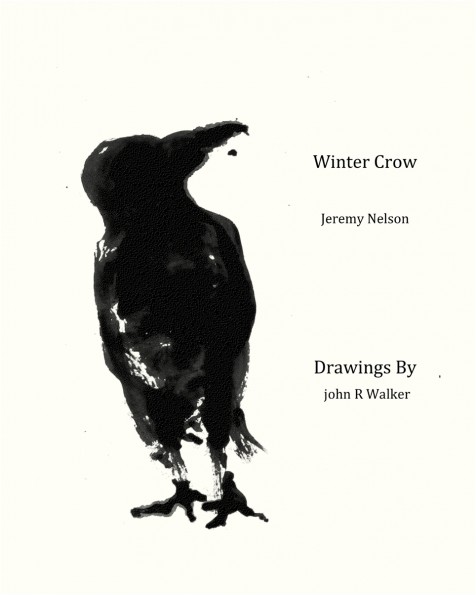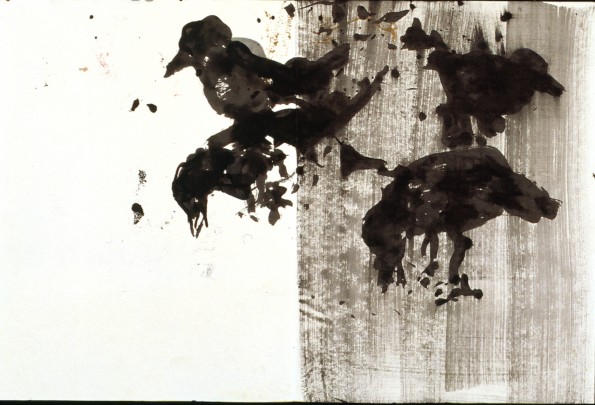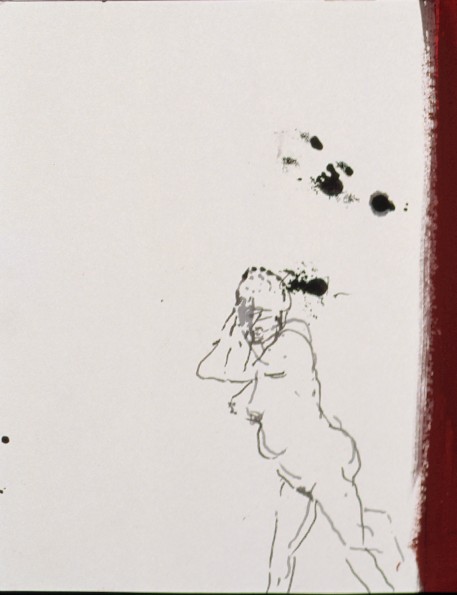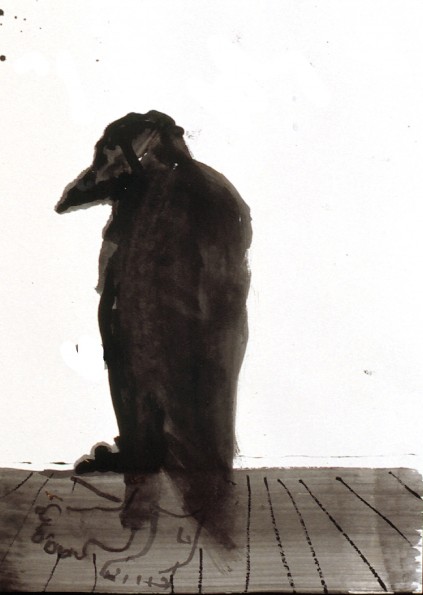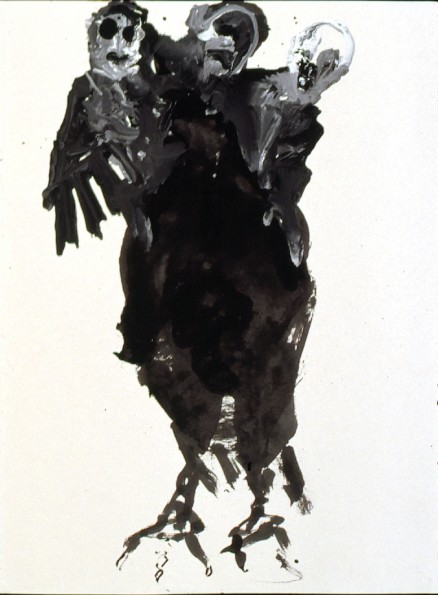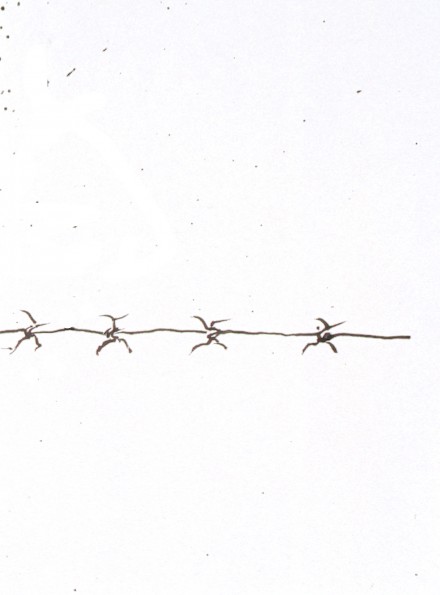Winter Crow
Winter Crow is a work of poems by Jeremy Nelson and drawings by John R Walker. It’s theme is the Sho’ah and it is particularly concerned with the creeping public amnesia surrounding this unparalleled atrocity.
Winter Crow was first published in September 2005. This new digital revised edition was published in August 2013.
Copyright John R. Walker
All rights reserved as above.
I
Winter Crow
Crow in the winter light
is the dark companion.
Scaled legs apart,
his ironic umbra
cocks head, quizzically
proclaims
across white day
that one worst word –
end of all language.
Tableau
It is winter: the woman’s coat thin check;
the dress black cotton. Her head and her daughters’ heads
are covered by scarves. The boy wears a cap.
Hand-held, the smallest child walks between
her mother and sister. She is well coated
against the chill; she moves willingly like one
wanting to learn. What have they told the child?
Her sister sees that gladness is no longer a gift,
It’s not fever that frets the mother’s mind
but something most frightful, something too pained
to weep. The boy has lagged behind. His will
would wisely take him elsewhere, but the snout
that shunts him forward is greater than God’s love.
He must go to where no child would go.
Ice creaks under their walk. The air is as sharp
as gas. Its cold incinerates. No one
can take the scorched smell of smoke from their minds.
With a meekness not given them by Moses, they move
into the shadow of a psalm’s black valley.
Ten miles away, Jesus the Jew is worshipped.
Shower Room
As Zyclon B slides
through that child’s heart,
that woman’s mind,
death voids all trace,
and who strives now
to remember
is living history’s
true monument.
A photograph –
on a curious gaze –
sometimes imprints
perhaps an essence;
sorrow shudders,
stabs through the eye
and, like a child
in the wind, cries out:
“How could my kind
do this?”
A Few
I sense the dead
here, for there’s still
an unseen smoke.
Can one mistake
the smell of it?
They sought for joy,
as I did once.
No taste for it
lingers in the
red brick ovens
of the furnace block.
The womb-formed hand,
eyes and mind,
the heart and feet
were all turned there
to fire dust.
A few by chance
and time escaped
the final scourge.
They held to life
as thin with hope
as a hangman’s rope.
An Ordinary Evil
Give me a true observant eye
that sees in people who they are
and sends out nothing from itself
to make another’s innocence
appear the monstrous mood that I
export, the beast I hate when lodged
in you; contempt for that projected
ghost allows the Nazi in my heart
to thrive and scheme unrecognised
and step by Pauline step to grow.
Then he’s the one that coming home
from work will pat the wagging dog
and tuck his children into sleep,
tell the bedside tales he heard
as a child, drink wine with his wife
and from his mind block out the smell
of ash, the blanch of skulls that fire
does not break but his foot must.
Eyes that will not love do not
see but merely note the seem
imposed on things. If joy’s a proper
light for truth, then love’s its maker –
I mean attentive joy that holds
the other and admires it
in all its parts because it is
itself: the winter tree whose top-
most twigs now shine like spokes in wind
and light, each wound healed smooth with bark;
and buds that like the tips of war
shells wait for spring to cry explode.
And if its depth’s not wickedness
that’s how I’ll view the human face
when joy’s the artist in the eye;
but if I dare not know myself
the heart will launch dark shades to make
the other first my enemy.
And next day when I wake and dress
in power’s cap and shiny boots
I’ll pat the dog, my children’s heads,
I’ll kiss the wife and go to the camp
with you, my friend – yes! you who walked
with me the weekend city – then herd
my quota to the killing place;
and there I’ll scourge and crucify
and burn – and know we’re doing right.
The Shoe
It’s merely a child’s shoe,
and she who wore it once
is dead.
So toss it on that pile there
where the thousands
grow into the millions
building the pyramids.
We tidy the past up
and put it out of mind,
for who can feel such things
and not go mad?
If to forget is all,
our peace lies there and not
in horrors that once were –
though we dream them still
in that nightmare fiction
called history.
Let no strong word
warn us like a prophet’s
tongue of what the heart’s
black stone brings us to
again and again.
It is too hard to live
such truth . The real destroys
the moment’s pleasure, wrecks
the time to come, and we
would rather hear the loud
rock siren whose beat stops
thought and wildly bind
ourselves to speed and the sex
gods selling the great life.
We live in the moment –
not the eternal one,
for that’s the old nonsense
of the dead Jew.
The shoe you found
is merely a child’s shoe.
So toss it on that pile there
and forget – forget.
Besides the girl is dead,
of another country,
and another time.
Ezekiel
From butcheries,
from the death factories,
from long ovens
and the mass graves,
call them back.
That their bones rise,
their ashes live.
and new speech bloom
like jasmine spring,
Ezekiel,
call them back!
Pedestrian
A rabbi at thought in his beard
ambles this river-wide street.
His heart is with Moshe.
Maimonides inhabits his mind,
King David his tongue.
His Hebrew is jasmine.
Stooped in his coat of black,
he stands out from the throng.
His apple-bright soul
is singing shalom .
Epstein’s Peniel
As Jacob’s head tilts wildly
back, the Angel’s eyes
burn down – like flame
to temper steel.
That face is fierce with mercy,
and what it finds in Jacob’s
strength it wounds
and names anew.
Bruised, exhausted, blood-
smeared – from his alabaster
deep Israel gleams.
Postcard from Masada
Sodium green, the Dead Sea
floats the desert hills away.
Gales grind the rock.
Air tastes of dust.
Winter cloud carries
cold rain.
It loosens the land.
The gazelle that leaps
from cliff to cliff
is the Dead Sea’s rainbow.
Desert trees camp alone.
Cloud shadows move
like grazing shoals.
The nets of mountains
cannot trap them.
That is not snow
on the white road
but sand as bleached
as men’s bones.
On this plateau rock
Herod once built
a fort for safety,
a palace for pleasure.
Across their cisterns
a chill wind keens
in ancient Aramaic.
Masada’s
the hardness of Hebrew,
the fierce shape of courage.
Eleazar,
fought against Rome.
Driven here,
his troops and their kin
refused to be slaves,
and he and his men
slaughtered themselves
with woman and child.
The few who escaped
cried to Josephus.
Still the land smoulders.
Like battle smoke
still the dust swirls;
and sins of the present
as those of the past
grow faint like the hills.
Killers
Killers,
who praise
idols,
are not
martyrs.
To mix
Allah
or taint
Adonai
with bombs
that breed
by the
day, with
bullets
that fly
in the
night,
to foul
with random
Death,
strapped to
Despair,
Jacob’s
children,
to split
with a
rifle’
curse the
Prophet’s
men in
holy
Hebron
is to
butcher
Sarah,
slaughter
Hagar.
Murderers
are not
martyrs.
II
Kostas Karmayolas
On the holy mountain
the monks are wailing
for the spilt seed,
the midnight clotted blood,
the lost children.
Two hundred, Kostas said.
Between Tolo and Assini
two hundred men were marched out.
Their brains creaked and jolted,
their minds a galaxy across
with the greatness of terror.
Bullets broke their lives
in an instant
as if balloons had burst.
Last season’s olives are too hard
for grief to digest.
Only earth can consume this sorrow,
only wind and the sea dissolve.
In late afternoon
light trawls the sea
to the white bone bottom.
Waves move under the skin of the water,
from beach cafés, juke boxes
derange the quiet.
An old man,
flesh of marble and leather,
dances and clicks, arms outstretched,
bows like a wave breaking and claps.
Calls Chorevete.
Before him,
his shadow straightens and stamps.
Wild goats caper
on the Breasts of Aphrodite
or stand stock still there.
Kostas thinks he sees their yellow eyes.
He yearns for his father,
the greatest of dancers.
Gold on the black bay
the marble island
dies last into dark.
Beyond the stars,
beyond night and mourning
an old man dances.
Ideology
Righteous pistols
preach
to kneeling skulls.
Hiroshima
As Hiroshima flared
for Truman von Clausewitz
in its bowl of green mountains
the free world of the West
clapped loudly and cried:
Victory, not death!
Yet even the womb child
collapsed in those flames,
and frail hopes of children
grew inly distorted
generation on generation
through the gift of the body.
At that moment of blast
the mountains blistered;
under the firework plague
trees turned to vapour,
and the ethics of innocence
fell to its ashes again
as in Eichmann’s Auschwitz,
Stalin’s gulag,
Churchill’s Dresden.
Nagasaki
Nagasaki
walled within its chamber
of doomed hills
concentrates the pragmatics
of the military mind:
this second strike
waging peace,
exporting death
to drive Death off.
All the President’s
generals chanting
to adult and child:
kill or be killed!
Atomic sacrifice
our sacred duty,
its moral instrument
the Fat Man
cloaked
in the Nation’s Flag,
singing while he falls,
as if to fife and drum:
Sweet victory has come!
Where Fat Man Fell
Against the museum’s white wall
blue dragonflies
lift and hover on leaf-veined wings.
They trap my sight;
they take me down deep to the past,
into that pit
where Fat Man fell,
Adviata of death,
President’s gift
of a thousand suns,
to an alien people.
Myriads instantly ceased
amid red ash of wood
and paper, fallen towers, splintered
steel and walls
standing in bits, stained with shapes
of the vaporised dead;
yet some still lingered in the toxic
dust – adults,
children – blistered, begging for water.
What’s done is done!
The past is always; it is endless,
the anti-amnesiac
source of truth. Open it up
to redeem the days.
Question and Answer
I
From cold ash
the dry lips
of children ask:
By what strange choice
did evil wish
to keep itself
within the bounds
of our scorched hills?
II
The art of war,
like all man’s art,
entails restraint.
We calculate
our ends, weigh up
child innocence
against our need.
You are the lambs
of sacrifice
on whose burned blood
we build our peace.
III
Orpheus
for Fr Frans Baartmans
By wound made dense,
she speaks to no one
and turned to the wall
goes from her pain.
Only my friend
dare call her up.
His flute lifts her.
She climbs from torpor
note by note,
opens her eyes,
smiles on a world
again made whole;
soft arpeggios
then drift her back
to that blank womb.
Dying Bee
Your once exquisite
sense of place has gone.
You’ve lost your hive
and cling to a dry bloom.
O maker of sweetness,
mistress of alchemy
the night has come.
Autumn Lament
Into half chill
autumn goes.
The ageing trees
are turning mad,
shaking off
their winter clothes.
Carrion birds
with winter voices
are laughing over
summer’s carcass.
Each living leaf
and human tongue
will taste but silence
one by one.
Poems of Loss
I
The Angel has gone –
the brilliantly winged –
the one who carried us
always close to the real .
II
We deliver our children
to hard generations
where shalom -craft
has found no place.
III
The storm that blows
through our history
is amnesia’s gale,
bringing the dunes.
